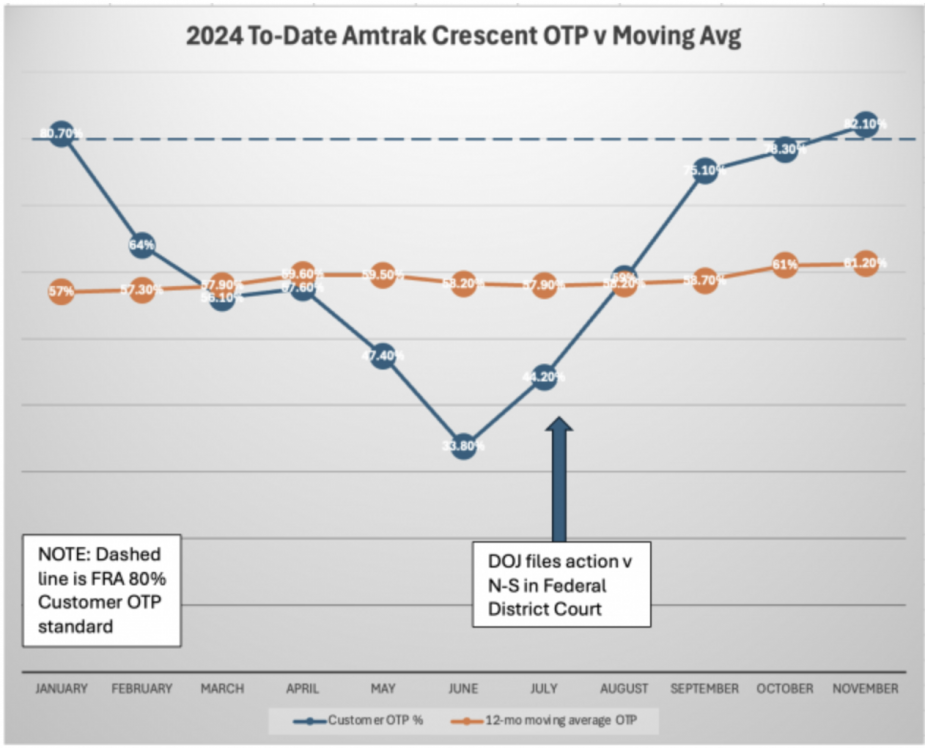Happening Now
DOJ Considering N-S Late-Trains Settlement Deal
June 27, 2025
By Jim Mathews / President & CEO
Are you angry about sitting on a late Amtrak train? Regulators and a Federal judge are still wrestling with late-train cases aimed at resolving late-train complaints related to dispatching decisions by freight railroads hosting Amtrak service.
Lost in the shuffle of a new Administration in DC, the Justice Dept.’s July, 2024, civil action accusing Norfolk Southern of violating the 52-year-old law requiring Amtrak to get priority from host railroad dispatchers remains open, with Justice currently reviewing a proposal from the railroad to resolve the case.
The government and the railroad are due to update Judge Amy Berman Jackson on the status of their negotiations on a potential settlement by July 11. Judge Jackson has granted the parties four extensions of time since the case began last year as they pursue an agreement.
Just as in the Amtrak versus Union Pacific case pending over at the Surface Transportation Board, the outcome turns on the question of what Congress meant when it used the word “preference” in the statute – 49 U.S.C. § 24308(c). The law reads that host railroads must give Amtrak “preference over freight transportation in using a rail line, junction, or crossing” unless: (1) there is an emergency; or (2) a host railroad asks the STB for relief, and the STB orders otherwise.
The Class I freight railroads have adopted the position that Amtrak is using “preference” to demand a kind of “presidential motorcade” level of exclusive track access diverting all other traffic, which Norfolk Southern and others argue is impossible.
Amtrak, DOJ, and this Association, contend that in practice nobody is actually adopting that sweeping a view of preference and that, in any case, the requirement for six months of sustained failure is a safeguard against one-time delay events being weaponized into unreasonable claims against host railroads.
Moreover, if the freight railroads were really experiencing unreasonable demands from Amtrak for “presidential motorcade”-style access, then why have none of them ever sought relief from the STB over the half-century of the law’s existence? The Justice Dept. noted in its own action filed last summer against Norfolk Southern that “no host railroad has ever sought, let alone been granted, such relief from STB.”
It's also probably worthwhile here to remind readers of some pretty compelling evidence that the Crescent’s delays on Norfolk Southern territory were largely avoidable: in the five months since the Justice Dept. filed its action, Customer on-time performance for the Crescent rebounded from a low of 33 percent to 82 percent in November (see graphic below). That’s good enough to meet the 80 percent standard set out in regulations during the last month of the first Trump Administration in 2020.

Funny how getting hauled before a Federal judge can concentrate your mind...
In the Union Pacific case, STB’s investigators, analysts, and the Board members themselves are engaging in a very thoughtful exercise to fully understand what Congress meant when it described “preference” in the statute. Norfolk Southern last year argued that the DOJ case – faulting it over failure to give preference to Amtrak’s Crescent – should be put on hold until the discussion over the meaning of preference is resolved.
According to status updates filed to the U.S. District Court for DC, Justice and Norfolk Southern have met several times in person since last Fall – including most recently in April – to try to hammer out an “amicable settlement” to resolve the case.
DOJ told the Court last month that “the Parties were unable to reach agreement on all material issues” during the October and December meetings, but that, following two more in-person meetings after the Trump Administration took over “the Government is currently reviewing a proposal by Defendants” to dismiss the case or transfer jurisdiction.
"On behalf of Amtrak’s onboard service staff, I want to thank the Rail Passengers Association for honoring their hard work with this award. The past couple years have indeed been difficult for Amtrak onboard service staff – coping with furloughs and job insecurity, adapting to changing protocols and services, not to mention the unfortunate events such as a tragic derailment and a fatal shooting. Nevertheless, our dedicated members at Amtrak have handled these hurdles with the care, attention and diligence for which they’re known. We thank Rail Passengers for their acknowledgement of our members’ hard work and, as always, look forward to seeing you on the rails."
Arthur Maratea, TCU/IAM National President
December 21, 2021, on the Association awarding its 2021 Golden Spike Award to the Frontline Amtrak Employees.
Comments